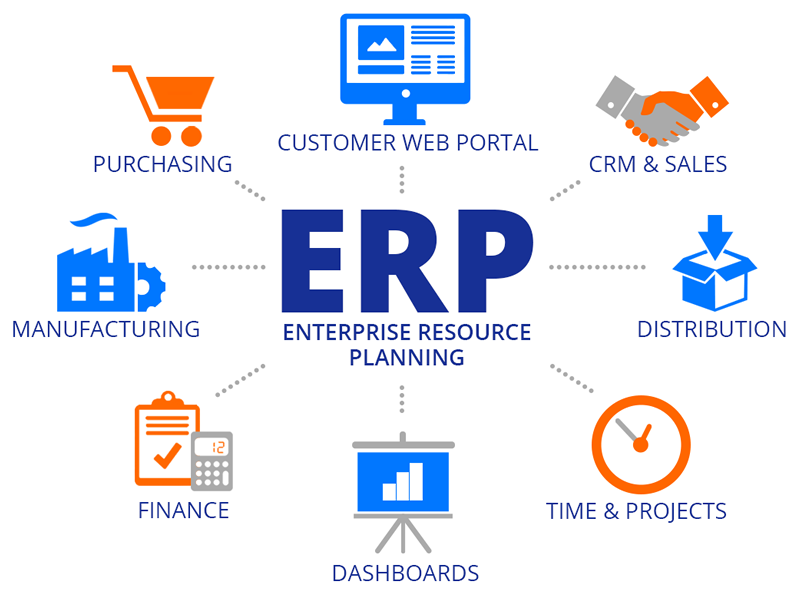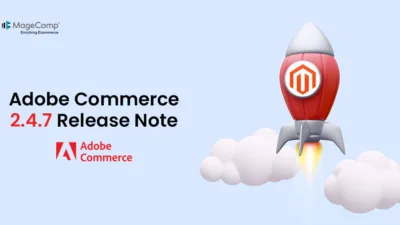While an online store can function without ERP integration, Magento ERP software can improve the consumer experience significantly by streamlining different tasks. In addition, the ERP for Magento helps generate value at every transaction throughout the supply chain. So, rather than looking for a stand-alone solution to boost business productivity in 2023, selecting an ERP integration that connects with your Magento-based website for synergistic results is prudent.
What is the Magento ERP Software?
ERP (Enterprise Resource Planning) is a software tool companies use to monitor and integrate different aspects of their business, regardless of size. In the case of retail businesses, these aspects may include product planning and development, manufacturing, inventory management, sales, orders, customers, employees, marketing activities, and reporting.
Retailers may boost their daily store operations and engage with customers more efficiently with the collected data from integrating their Magento website with the ERP system.
How to Choose a Magento 2 ERP System
When selecting ERP software, it is important to consider several factors, such as:
- Your company size: Larger companies may require more robust systems to handle complex operations and a greater volume of transactions. On the other hand, smaller companies may use a simpler system that the business grows and can easily scale up.
- Your fulfillment operations: Based on your business model, you should choose a retail ERP system that handles your operations efficiently and accurately. The best ERP for retail companies should include tracking inventory levels,managing order fulfillment, and generating shipping labels and invoices.
- The features of your ERP features: It should help you manage your business operations effectively. You should also consider how to integrate your ERP software with Magento through real-time data synchronization or automated order processing.
- The type of your retail operations: If you have brick-and-mortar retail locations, you may need a Magento POS system to handle point-of-sale transactions and other business activities such as order management, customer segmentation, inventory management and more. You may need a system that can handle EDI transactions if you have wholesale operations. If you manufacture products, you may need a system that can handle bill of materials management and production scheduling.
Top 5 Benefits of Using Magento ERP System
Reduce inventory cost
Integrating an ERP for Magento provides real-time sales information, as the ERP system instantly reflects any sales on the Magento site. As a result, system users can effectively plan purchases and reduce costs when it comes to inventory.
Moreover, the integration also allows for instant updating of the ERP item inventory with any web transactions. This feature makes it easier than ever to manage your inventory, such as keeping track of your stock since every web transaction has automatically updated the stocked items. This also helps retailers avoid stockouts, overstocking, and other issues due to inaccurate inventory management.
Centralize data management
Centralized data management is a key benefit of integrating an ERP for Magento. By doing so, retailers can have a unified platform for managing all the data related to their business, such as customer data, order data, inventory and purchasing data.
The Magento ERP system allows retailers to make informed business decisions based on real-time data insights. For instance, retailers can quickly identify which products are selling well and which are not and make informed inventory management and purchasing decisions. They can also gain insights into customer behavior and preferences, allowing them to personalize their marketing and promotional efforts.
Moreover, centralized data management can help streamline operations by reducing the need for manual data entry and minimizing the risk of errors. With all the data in one place, retailers can easily track and manage their store operations, saving time and resources.
Enhance customer experience
Another benefit of using Magento ERP software is related to customer experience. By integrating the ERP system, retailers can streamline their operations, reduce errors, and provide accurate information to customers. It, therefore, can optimize user experience, providing better customer experiences.
By integrating an ERP system with Magento, retailers can have real-time visibility into their inventory levels, ensuring that customers can access up-to-date stock information. For example, integrating an ERP system with Magento can provide real-time visibility into inventory levels, ensuring customers can access up-to-date stock information. Therefore, customers can make informed purchasing decisions, reducing the likelihood of ordering out-of-stock items, and leading to a better customer experience.
Automate process and reduce errors
On the one hand, the ERP tool and Magento e-commerce connection are primarily motivated by the automation of numerous procedures. The reasons are obvious: manual tasks such as entering data, cross-checking stock levels, updating catalogs, and tracking orders, saving resources such as time and effort. Furthermore, automation improves collaboration and communication between the sales staff and the back end. Backorder management remains consistent since a product’s online availability is linked to stock availability and is updated without human intervention. As a result, integrating ERP software with your Magento e-commerce platform is a lucrative alternative because it directly impacts system productivity.
On the other hand, business owners will fully integrate purchase, payment, and shipping information into the system. Furthermore, inventory details can be uploaded from ERP to your Magento gateway, eliminating the need to re-enter the data. Finally, the integration will save employee time on time-consuming tasks such as data re-entry, perhaps reducing errors and data redundancy.
Improve financial management
With a Magento ERP system, retailers can track revenue, expenses, and profitability in real-time, providing a clear view of their financial position. This can help retailers make informed financial decisions and optimize their eCommerce business operations.
Moreover, an integrated Magento ERP system can provide retailers with accurate and up-to-date financial data, allowing them to generate financial reports easily. This can help retailers gain insights into their financial performance and identify areas for improvement. Financial reports can also be customized to meet specific business needs, providing a tailored view of financial data.
Additionally, integrating an ERP system with Magento can help retailers streamline their financial processes, such as billing and invoicing, reducing errors and improving efficiency. This can lead to faster payment processing and improved cash flow, benefiting the business.
Summary
On top of that, integrating ERP software with Magento can provide significant benefits for retail businesses, including centralized data management, improved inventory and financial management, enhanced customer experience, and reduced inventory cost. However, careful planning and execution are necessary to ensure a successful integration.










